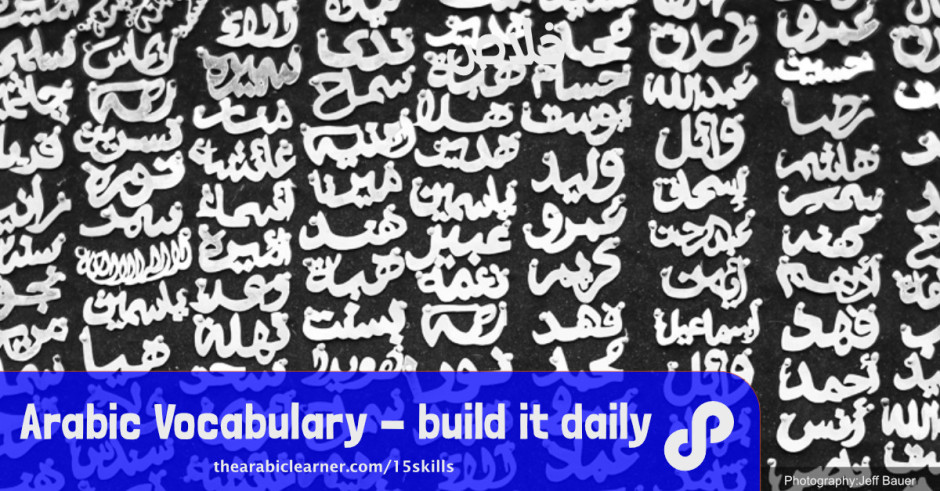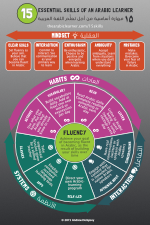Arabic Vocabulary – build it daily
Build your vocabulary daily by adding at least one new word or expression to your repertoire each day. There will be days where you will learn much more than one item, but by setting a minimum of one term per day, you will ensure that your mind stays freshly focused on expanding your active vocabulary at all times. Over time, this will lead to a significant increase in your ability to understand and express yourself in Arabic.
This article is based on the 15 Essential Skills of an Arabic Learner.

My wife and I walked into the five star hotel, surrounded by people dressed in all kinds of chic, formal, and dazzling attire. My wife looked incredible. I was feeling pretty good. The wedding reception we were attending was fun. The music was loud. The moon was reflecting off of the pyramids nearby. Cairo nightlife at its best. Arabic vocabulary was not on my mind.
Needing to make those final last minute adjustments in front of a mirror before stepping into the ballroom, we made our way to the front desk to ask about the whereabouts of the washrooms.
Andrew: mesaa’ il-kheer / مساء الخير (Good evening)
Receptionist: mesaa’ in-nour / مساء النور (Good evening)
Andrew: feen il-________ / فين ـــــــــ (Where is the ___________?)
Substitute in the blank space above a crass, inappropriate word for “restroom facilities”. Use your imagination. Or don’t!
Wife: <facepalm>
Receptionist: (awkwardly) hinaak / هناك (Over there…)
You may be wondering why this was so awkward for my wife and the receptionist. It was my choice of vocabulary for the washroom. I had learned the word on the street, and didn’t realize that it was not considered “polite language” for the setting that we were in (for those with any background in linguistics, you will recognize this as a sociolinguistic plot twist).
This is what I call a ‘Vocabulary Incident’. That is not a scientific term, or a term based on research. It is just my term that I use for situations involving Arabic vocabulary when something doesn’t work. I use it to refer to times when:
- I don’t know a word in Arabic that I need to know
- I know a form of a word that is not appropriate to the context I am in (such as the situation above)
- I think I know a word or expression in Arabic, but the word/expression that I know is not the correct one
The incident above ended without further embarrassment to my wife, al-Hamdu lilleh / الحمد لله (praise God). We managed to make it to the restrooms and do final hair/outfit adjustments without me saying anything else awkward or inappropriate.
In the process of my learning Arabic, I have had to face all kinds of situations like this, where I am reminded of my need to both increase my Arabic vocabulary, and to improve my ability to use it in contextually appropriate ways.
Vocabulary building requires exposure and context
During the interviews I had last summer with six Arabic language educators, I was particularly interested in asking them about their thoughts on vocabulary acquisition. My reason for that was that I believe that vocabulary is one of the keys to rapidly gaining fluency in Arabic.
The things that came up consistently as they talked were (a) exposure to large amounts of vocabulary, and (b) exposure in context, and (c) memorization.

Abbas Al-Tonsi was my professor back in the 90s. He was responsible for launching me on a high-intensity sprint in Arabic vocabulary acquisition. My memories of life while taking his class include many hours of building vocabulary out of class, and then being expected to be able to use it in class. He had an amazing way of motivating us to cram more Arabic vocabulary into our heads than we thought possible, while not making us feel judged if we couldn’t come up with the correct word. Good teacher.
In the course of discussing vocabulary with Abbas during my interview with him, he emphasized the importance of listening to Arabic as a way of building vocabulary[1]. Constant, daily exposure to spoken Arabic in context helps to build your receptive vocabulary (the vocabulary you can understand, but cannot necessarily produce). In his experience, students who listen a lot gain a lot of vocabulary, pure and simple. This listening does not necessarily need to be active listening all the time. The Arabic can be playing in the background as you do other things such as cooking or cleaning. Conversations can be taking place around you as you sit in a coffee shop or a mosque.
Put simply, high exposure to Arabic conversations and interactions (not just out of context words) yields good results.
He also recommended writing out vocabulary and putting it on stickers or signs around the house. Put stickers on items such as the couch, doors, the microwave, and so on. Make lists of food items in the refrigerator. Label your vocabulary in the context of the physical surroundings of your living space.
My other interviewees gave similar points of view. Exposure, with context, builds Arabic vocabulary.

Dr. David Wilmsen emphasized reading to gain vocabulary in context. “To acquire vocabulary you should read a lot, in which ever [dialect] you need to remember. If you are learning 3aamia / عامية (colloquial Arabic), you need to read 3aamia / عامية. If you are using fuSHa / فصحى (Modern Standard Arabic), you need to read even more fuSHa / فصحى (Modern Standard Arabic)”[2].

Dr. Aiyub Palmer emphasized the need to be attentive to vocabulary in context outside of the classroom. “Vocabulary basics can be learned in class, but outside of class students need to notice vocabulary”[3]. He recommended that when learners find themselves in situations where they don’t understand certain vocabulary, they can copy and paste it into a translator to help understand it. This can be done on the spot with a smart phone, or the word can be noted for later and checked on a computer.
Committing Arabic vocabulary to memory
The challenge that most people face in growing their Arabic vocabulary is how to commit it to memory.
This challenge has become more difficult in recent years because of how we as human beings are adapting to our new information environment. In a world where we have access to most information within seconds or minutes, memorization seems like a throw-back to a previous age. It is de-emphasized in education and learning.
The problem is that real conversations between human beings, in real time, still happen at a speed that defies looking up words while maintaining the communication flow. Even though Skype and others are trying to solve this problem, it’s still going to be a long time until technology allows us to bypass the need for having memorized words ready to use in our conversations.
With decades of experience in teaching Arabic, Abbas Al-Tonsi’s view is that memorization is necessary. “Still, memorizing lists of vocabulary is a necessary step. If you memorize a word and it is not a frequently used word you will have passive knowledge of the word, which is still knowledge and an increase in vocabulary.[4]”
 One approach to acquiring vocabulary is to organize it into units of related words and expressions, decreasing the seemingly random collections of words that are often found in Arabic textbooks. Dr. Kirk Belnap, Director of the National Middle East Language Resource Center at Brigham Young University, says, “I’ve become a big fan of the approach where you learn chunks [of vocabulary], chunk learning, and where you’re learning chunks that are contextualized and become a part of a repertoire.”[5]
One approach to acquiring vocabulary is to organize it into units of related words and expressions, decreasing the seemingly random collections of words that are often found in Arabic textbooks. Dr. Kirk Belnap, Director of the National Middle East Language Resource Center at Brigham Young University, says, “I’ve become a big fan of the approach where you learn chunks [of vocabulary], chunk learning, and where you’re learning chunks that are contextualized and become a part of a repertoire.”[5]
Five tested (by me) ways to memorize Arabic vocabulary
Different people memorize in different ways. Here are five ways that I have seen people effectively memorize vocabulary:
 1. Vocabulary lists
1. Vocabulary lists
One of my readers calls this “the brute method”. Make a list on your computer or write it out by hand, and work your way through it. This is not a “sexy” method, and it flies in the face of the de-emphasis on rote learning. But for some people it works. I am not big fan of rote learning, but when it comes to vocabulary, I have actually found this approach to be somewhat effective for me, and a starting point that I can use immediately.
 2. Flashcards
2. Flashcards
Flashcards are a variation of the vocabulary list. Although the difference is small, the separation of each word with its meaning onto different sides of a single card allow all kinds of different variations of the list method. Changing the order, removing memorized terms from the stack, going from Arabic to English (receptive) or English to Arabic (productive) are all easier with flashcards. I believe that printed flashcards are helpful because they have a tactile element to them, which can help people with certain learning styles (I’ll talk about software based flashcards, which I also like, below). In my newly released online course the Egyptian Arabic Absolute Beginners Course, I have included printable flashcards for each lesson because I think they are important for many learners.
 3. Playlists
3. Playlists
Making (or buying) recordings of the vocabulary and then putting them into a playlist on your phone is one way that can be very helpful for some people to learn vocabulary as they drive, take the subway, wash the dishes, etc. Most audio software can be set to leave a gap of several seconds between each file it plays from the playlist, which can be helpful for repeating the word. In my Egyptian Arabic Absolute Beginners Course , I have included downloadable mp3 files of every word or expression because I believe that this method can be highly effective.
 4. Pronunciation focus
4. Pronunciation focus
Some people acquire vocabulary effectively by focusing intensively on pronunciation, and recording their own voice saying the vocabulary. This can be a highly effective way to memorize for some people, as it has both an audio and a visual element (waveforms of the word being spoken), as well as the time taken to actually produce the word verbally.
One of my readers just emailed me this morning about the way he approaches pronunciation, which I believe can also be a very effective way of acquiring vocabulary: “The way I have practiced foreign language pronunciation (e.g., Mandarin Chinese and Brazilian Portuguese) is that I convert the audio files into Audacity®’s format. Then I introduce longer spaces between the teacher’s phrases and record my own voice imitating or answering on a separate track. I play the edited Audacity file back and listen to my own pronunciation. Then I go back and re-record my voice. Iterate n times.[6]”
 5. Vocabulary software
5. Vocabulary software
Some software products combine multiple approaches to vocabulary acquisition into one package. They will typically have flashcards, clickable audio, visual pictures, and in some cases the ability to record your voice. Most of them allow you to create new words and organize them in lists.
I am predisposed toward vocabulary apps (if done well), because in 2005 I published 3 pieces of commercial software with the American University in Cairo Press, entitled “Egyptian Arabic Vocab Clinic®”, “Modern Standard Arabic Vocab Clinic®”, and “Modern Standard Arabic Verb Clinic®”. These packages are no longer in distribution since the technology has since become obsolete, but I do have a signup list for more information on a possible future release, if you’re interested. My current favorite apps for acquiring Arabic vocabulary are Memrise, Anki, and Quizlet, all of which can be used for free or upgraded for a low price.
Consistency and Spaced Repetition in acquiring vocabulary
One smart approach to acquiring vocabulary is through spaced repetition. Spaced repetition means that as a learner progresses through new vocabulary, words and expressions that are “learned” are moved into a “previously acquired” category (or a series of categories) and are subsequently reviewed at greater time intervals (spaces) than items which are not yet “learned”.
 The spacing effect was first articulated by German psychologist Hermann Ebbinghaus (1850-1909), and began to be incorporated into educational approaches in the 20th century. In the 1960s and 1970s, it was incorporated into some language learning methodologies such as the well-known Pimsleur program. In the past few decades, it has become increasingly used in computer-assisted language learning apps. Spaced repetition is based on research of how the brain processes and retains new items, and research has shown that it can cause a significant increase in the speed of vocabulary acquisition.
The spacing effect was first articulated by German psychologist Hermann Ebbinghaus (1850-1909), and began to be incorporated into educational approaches in the 20th century. In the 1960s and 1970s, it was incorporated into some language learning methodologies such as the well-known Pimsleur program. In the past few decades, it has become increasingly used in computer-assisted language learning apps. Spaced repetition is based on research of how the brain processes and retains new items, and research has shown that it can cause a significant increase in the speed of vocabulary acquisition.
The three apps that I mention above, Memrise, Anki, and Quizlet, all allow (or require) the user to incorporate spaced repetition into their learning. Other well known apps that do not yet offer Arabic instruction, such as DuoLingo, also use spaced repetition.
I think that spaced repetition is a great way to enhance vocabulary acquisition for a person who is already working on the basics of Arabic vocabulary learning. My only hesitation with it is that I have seen a few people get so focused on setting up for themselves a “smart” system that uses spaced repetition, that they end up either never perfecting their system and thus never launching it. Or they create a system that is difficult to maintain over a long period of time, causing them to stop using it before they reach their desired level of fluency.
If you have the capacity and ability to make use of spaced repetition, go for it. It will speed up your learning process.
If not, my recommendation is to start with one or several of the methods I have listed above to begin memorizing vocabulary TODAY, and get that in place before you worry too much about developing a “smart system”. “Simple now, fancy later”, when you have a habit solidly in place. You want to establish a habit of acquiring vocabulary that will give you success over the long term.
Memorize at least one word EVERY DAY, and you will be surprised at the effect over time. This is based on the idea of The Slight Edge (affiliate link, contributes toward website upkeep) by Jeff Olsen – one of the most valuable books that anyone can read, and that I recommend to everyone.
I would love to hear your thoughts about vocabulary acquisition. What has worked for you? Do you agree or disagree with anything I have written? Other thoughts? Please take a minute to respond to this article and let me know your best practices!
[1] Personal interview with Abbas Al-Tonsi, May 1, 2015
[2] Personal interview with Dr. David Wilmsen, April 28, 2015
[3] Personal interview with Dr. Aiyub Palmer, May 21, 2015
[4] Personal interview with Abbas Al-Tonsi, May 1, 2015
[5] Personal interview with Dr. Kirk Belnap, June 4, 2015
[6] Personal correspondence with Lincoln Berkley, March 14, 2016



 RSS - Posts
RSS - Posts
I learn words best in the context of a sentence I read or heard. When I read the headline of a newspaper, say, and find I understand all the words except one, or maybe two, I ask an Arabic speaker the meaning of the word/s I don’t know. I then write out the entire headline and repeat the sentence to myself a few times. Then, somehow, the words I want to learn are more readily committed to memory than the naked word by itself. I think this is because the word is doing something in the sentence or something is being done to it. It has a function.
I agree with Ramez on the context. I find that using Anki flashcard app is nice, but to make it more effective for myself I need to use it in a sentence in my head as I’m flipping through cards.